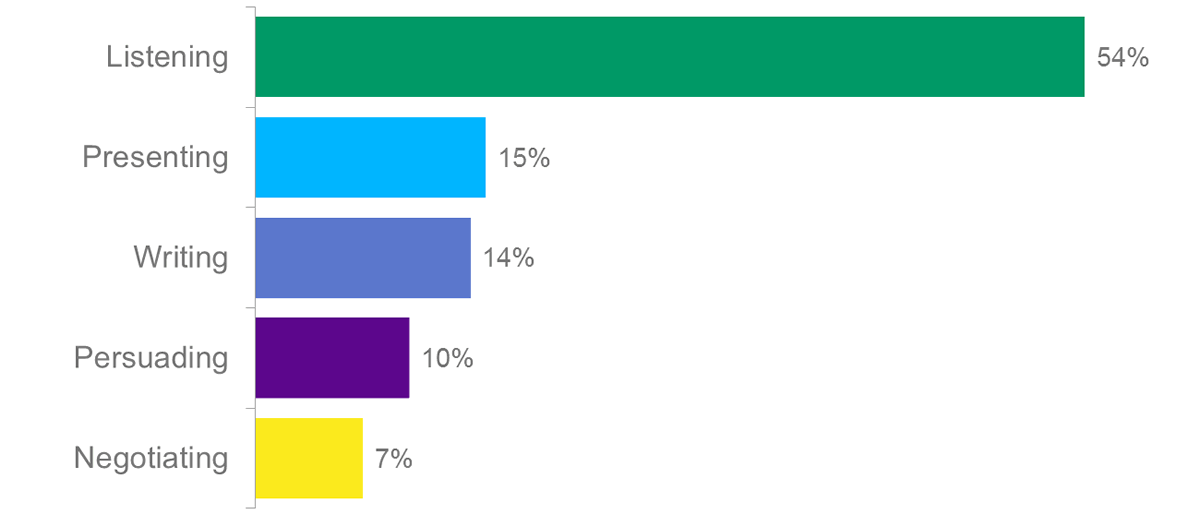Listen Up: Communication Skills and Your Career
by Julia VanDeren, CFA Institute
Nearly every finance career guide emphasizes the importance of strong communication skills.
About 60% of the jobs posted on CFA JobLine and nearly 50% on eFinancialCareers.com — both niche job boards focused exclusively on the financial services industry — suggest that communication skills are required of successful candidates. It’s easy to skim over a phrase like “strong communication skills required” in a job description and wave it off as a given since you’ve seen it so often. You may not even give a second thought to putting it in a job description when you’re hiring for your team. Perhaps it’s already templated into the role descriptions you approve when hiring.
But, the ubiquity of the phrase, or those like it, shouldn’t keep professionals from taking it to heart. After all, the ability to listen, persuade, write, negotiate, and present are among your best tools for differentiating yourself in your career. Solid technical knowledge makes you capable of doing your job, but great communication skills help you excel at it.
We asked CFA Institute Financial NewsBrief readers which communication skill — listening, presenting, persuading, negotiating, or writing — has been most useful in their careers. In round numbers, of the 655 participants, 54% opted for listening, 15% selected presenting, 14% said writing, 10% chose persuading, and 7% indicated negotiating.
Which communication skill have you found most useful in your finance career?
Different functions in the industry demand different degrees of each of these expertise. This seems to be reflected in the responses. For example, while persuasion and negotiation are closely related influencing skills, the context that helps distinguish them is more likely experienced by those in sales, business development, and relationship management functions.
So while most finance professionals will often need to convince others to accept their ideas — to persuade, in other words — only some will need to do so in face-to-face, give-and-take discussions, — negotiations — that yield mutually beneficial agreements.
That listening is the top response and by such a significant margin indicates that there is more to its value than just its ubiquity across all functions. Listening is fundamental to all influencing skills. As James J. Valentine, CFA, puts it in his book Best Practices For Equity Research Analysts, “analysts can’t possess skillfulness in being aware of others’ needs if they don’t hear other people’s concerns.” A deep understanding of what others need is the most important tool you have to influence them and, in turn, gain trust, support, and success in most any role. Influencing aside, listening skills are also fundamental to the information gathering process necessary for deep analysis.
Since listening skills are so critical, what are some ways you can make sure you are listening well? There are numerous articles available online, books you can read, and even courses you can take. But there are three simple things you can start doing right now:
- Stop multi-tasking when you should be listening: There is some debate about whether people are ever capable of multi-tasking effectively or if it can only work if you pair the right tasks. Either way, listening shouldn’t be sacrificed to multi-tasking.
- Demonstrate that you are listening: Do this physically when possible by facing the person who is talking and making eye contact. Do this audibly by summarizing what you hear and asking for confirmation or clarification.
- Do your best not to interrupt: With so much communication across geographies and cultures, this tip is not quite as simple as it sounds. We have all been on those conference calls when the lack of visual cues results in voices stumbling over each other and unintentional interruptions. Still, do your best to allow people time to complete their thoughts and perhaps even to have second thoughts.
What have you found is most helpful in developing listening and other communication skills? Share your answers and experiences in the comments section below.
If you liked this post, don’t forget to subscribe to the Enterprising Investor.
All posts are the opinion of the author. As such, they should not be construed as investment advice, nor do the opinions expressed necessarily reflect the views of CFA Institute or the author’s employer.
Copyright © CFA Institute
















